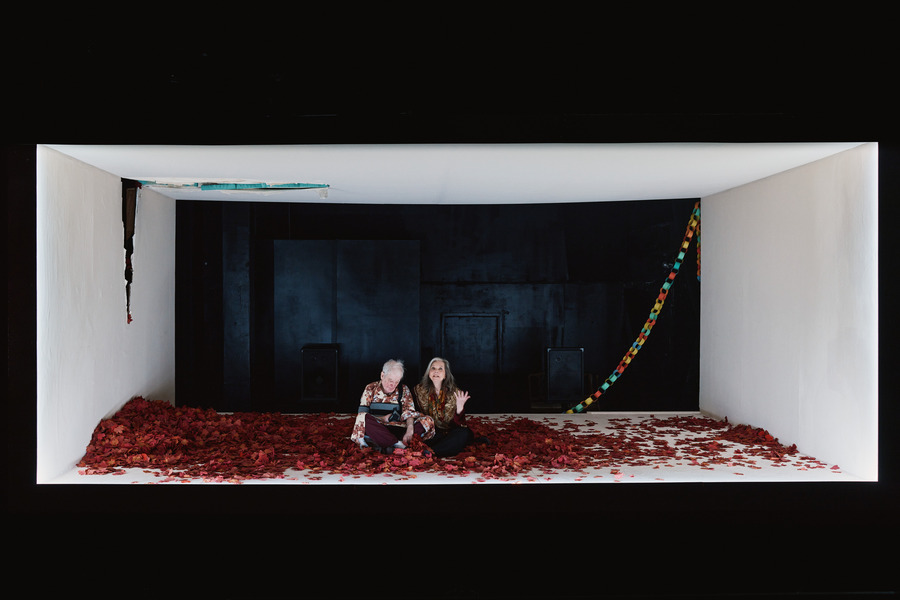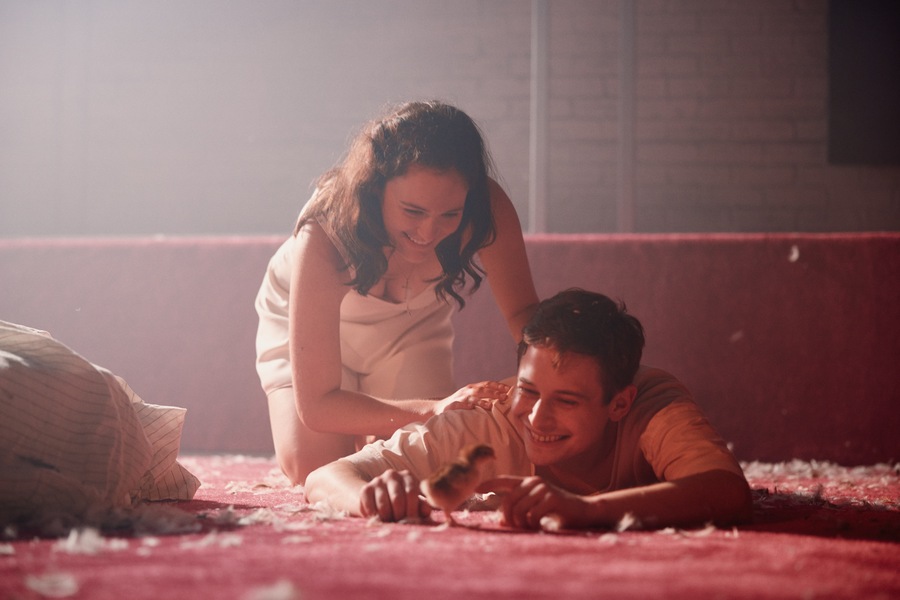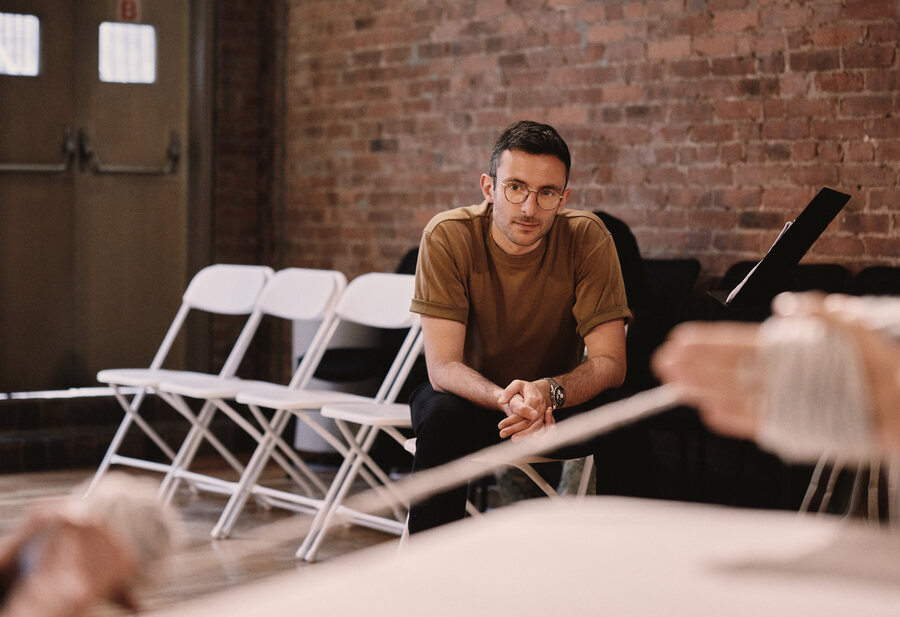In a loft somewhere in New York’s Flatiron District, an intimidating collection of theatre luminaries have gathered to create a new, “hyper-intimate” staging of Uncle Vanya. The cadre includes Bill Irwin, Marin Ireland, and, tackling Vanya himself, celebrated multi-hyphenate David Cromer. It’s a buzzy project: 16 nights only, 40 seats per night, sold out within 24 hours.
At the helm: a 27-year-old director with just three Off-Off-Broadway credits (and one Off-Broadway transfer) to his name. How does such an impressive ensemble—with Will Brill, Julia Chan, Will Dagger, Ann McDonough, and Virginia Wing rounding out Vanya’s cast—come to put their trust in Jack Serio?
It helps when others have gone before you. Each of Serio’s three major projects has boasted Off-Broadway royalty in its cast list. Handpicked by Austin Pendleton, a longtime mentor, to direct Bernard Kops’ The Dark Outside at Theater for the New City, Serio in turn cast Pendleton and Angelina Fiordelisi (a Tony nominee and founder of the Cherry Lane Alternative) in Rita Kalnejais’ This Beautiful Future at Theaterlab. And earlier this year, he directed six-time Obie winner David Greenspan in Joey Merlo’s On Set With Theda Bara at The Brick, as part of the Exponential Festival.
“He just makes things happen,” said Cromer, whom Serio has coaxed back to stage acting after four years away. Also a mentor of Serio’s, Cromer knows about reinvigorating an old text, having directed (and starred in) a stripped-down, widely heralded staging of Our Town in 2009.
Said Greenspan, “Jack is a very astute director. He’s a terrific collaborator, and there’s no baloney with him.”

Indeed, Serio’s stagings are stark, not so much bare-bones as cut to the bone, stripping texts down to only their most crucial needs. Since his time as an undergrad at NYU Tisch, Serio said he’s sought out “essentialism” in his work, trying to find how little is needed to effectively tell the story.
For The Dark Outside, a family drama set in a multilevel home, he opted for a white box with just a few chairs and a large pile of leaves. (Walt Spangler, who designed that set, has reteamed with Serio on Vanya.) Theda Bara transformed the Brick into a smoky, ghostly space, using only one long table and mirrors on both sides to conjure a haunting séance.
Alongside these essences, though, Serio is eager to create experiences that could not be replicated outside a theatre. Among his formative experiences was seeing Ivo van Hove’s Scenes From a Marriage, which guided audiences through three spaces at New York Theatre Workshop, where three iterations of the central couple performed concurrently.
“I didn’t know you could do that—that you could argue the content of a play in the form of it,” said Serio.
To pull audiences into Theda Bara’s strange séance, Serio and scenic designer Frank J. Oliva sat them with Greenspan around a single table dimly lit by hanging lamps. “It’s as if we’ve entered an alternate plane where specters might be summoned,” Laura Collins-Hughes wrote in a laudatory New York Times review.
While Beautiful Future was more traditionally staged, it concluded with an impressive coup de théâtre, as an egg, tended by the central couple, “hatched” to reveal an actual live baby chick, chirping excitedly onstage before an astonished audience.

For her part, Fiordelisi ensured that the Cherry Lane, which she was about to sell to A24, would remain available for Future’s eventual transfer, making it her swan song as both founder and actress.
“Jack had an intellectual approach which I thought was brilliant, as well as a deeply emotional understanding of the characters in the play,” Fiordelisi said. “I thought, this kid really knows what he’s doing.”
Serio’s career began when he was an actual kid. Unenthused by his high school theatre program’s offerings, he marched into a real estate office in his native Boston, at age 13 and asked to use an abandoned storefront to put on a play. The owner, a theatre lover whose daughter was an actress, agreed. (Serio later realized she was Pat Tierney, mother of Maura Tierney.)
“What if we not only put on our own plays, but did plays that young people weren’t being asked to do?” said Serio, recalling his early impetus. They first put on The 39 Steps, then Yasmina Reza’s God of Carnage, which earned coverage in The New York Times as a sort of curiosity. “All of a sudden we were sold out,” recalled Serio. “With people that didn’t know us coming to see a production of God of Carnage put on by 15-year-olds.”
The Boston Teen Acting Troupe, as it came to be known, grew into a legitimate company, staging An Inspector Calls and All My Sons. The troupe later performed at OBERON in Harvard Square, and its final production got a full run at Boston Playwrights Theatre in 2015.
“I don’t know that any of it was very good,” confessed Serio. But the animating spirit behind that troupe still drives him today: a disappointment with the work he saw being created, and a desire to white-knuckle more challenging pieces into existence. Coming out of the COVID-19 shutdown, Serio found himself dispirited by productions that purported to provide comfort in a moment in which he could find few.
“There was an ease to some of the work I was seeing that felt like it had answers to what our future was going to be,” said Serio. “I wanted to put a problem onstage and make you really sift through it.”
With a City Artist Corps grant (and a credit card for anything it didn’t cover), he put together This Beautiful Future at the Off-Off-Broadway incubator Theaterlab, where it sold out a short run in January 2022 during the height of Omicron. In Kalnejais’ play, two young lovers—Elodie, a 17- year-old French girl, and Otto, a 16-year-old German soldier—meet for a secret tryst in August 1944 on the eve of Germany’s defeat. Watching them behind glass, an older man and woman, never identified, sing contemporary karaoke and ponder how they might have lived their lives differently.
In asking audiences to empathize with a young Nazi soldier and consider a young girl’s complicity in sleeping with him, the play elicited some mixed responses. Helen Shaw, then writing for Vulture, felt that Kalnejais did “not dive into these tangled weeds, and the play wraps up by shifting towards sentiment.” The older couple’s place in the story also left some baffled.
“It was not everyone’s cup of tea,” Serio acknowledged. “The thing that people get really excited about, or the thing that they’re like ‘I do not under-fucking-stand the play,’ was the two older people.” As for the characters’ complicity in acts of evil, he considered that a question “you have to deal with.”

With both Future and Theda Bara (also often a challenge to follow), Serio’s slick presentations were a kind of misdirect: Hate, fascism, and all the vagaries of human ugliness lurked just beneath a carefully manicured veneer. It’s an approach that could serve him well on Vanya, in which vast depths of longing, resentment, and disappointment eventually puncture a seemingly serene surface.
The idea for this Vanya actually began with Julia Chan and Will Brill, who had always wanted to play Yelena and Astrov opposite each other. They arranged a reading and asked Cromer to read as Vanya. From there, it was a case of friends recruiting friends: Brill’s friend Marin Ireland had always wanted to play Sonya, Ireland’s friend Bill Irwin had always wanted to play Serebryakov, and so on.
Serio hopes that intimacy and clarity will help audiences experience the text afresh. Whereas recent New York stagings of Uncle Vanya have offered new versions, by Annie Baker in 2012 or Richard Nelson in 2018, this production will use Paul Schmidt’s renowned translation.
“My question was, what are our inherited ideas about this play, and how can I get out of the way so we can experience it immediately, like you’re watching a new work?” said Serio. “My answer, a lot of the time, is proximity.”
Cromer took some convincing. Typically self-effacing, he had proclaimed his own performance “terrible” after the first reading and insisted he was 10 years too old to take on Vanya. “I gave him every opportunity to let me not do it,” said Cromer.
But here they are, and now Serio will attempt to echo Cromer’s own feat: breathing new life into a classic. No pressure.
“My hope,” said Serio, “is that there’s a kind of double consciousness when you’re experiencing it—that you know this is a 100-year-old play, but you’re able to experience it brand new in this moment.”
Joey Sims has written at The Brooklyn Rail, Vulture, Into, TheaterMania, Queerty, New York Theatre Guide and No Proscenium. Joey is an alumnus of the Eugene O’Neill Theater Center’s National Critics Institute, and runs a theatre substack called Transitions.





